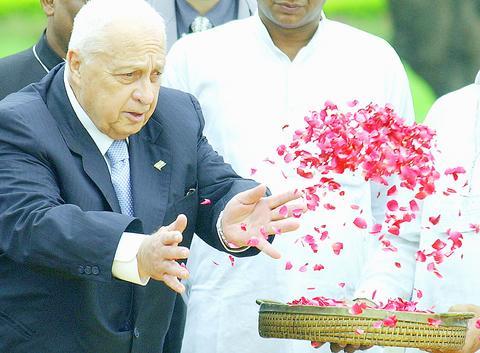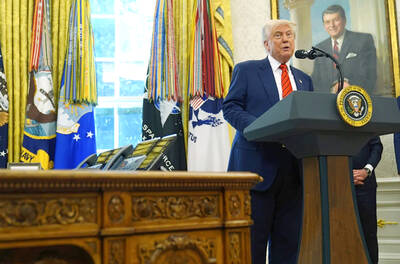Israel Prime Minister Ariel Sharon launched his historic visit to India by laying a wreath yesterday at the memorial of the subcontinent's great peacemaker, Mohandas Gandhi.
After the ceremonial welcome amid tight security and street protests against Sharon, the first Israeli prime minister to visit India then turned to an agenda of trade, counterterrorism and military hardware. Sharon hopes to seal the US$1 billion sale of an advanced airborne radar.
"I hope this visit, the first by an Israeli prime minister, will help us to move forward and accomplish all the things that we believe in," Sharon said. "We regard India as one of the most important countries in the world. ... We share our belief in democracy."

PHOTO: AFP
Sharon placed a wreath and threw rose petals on the memorial of Gandhi, the father of India's independence movement who was slain by a Hindu fundamentalist in 1948.
Following Sharon's arrival Monday for a three-day visit, India's neighbor and chief rival Pakistan warned that a military alliance between Israel and India would be "dangerous" and harm peace in the region.
"Such a collaboration should be avoided at all costs," Pakistani Foreign Ministry spokesman Masood Khan said.
Several hundred demonstrators marched yesterday through the capital, beating their chests and shouting slogans against Sharon. "Israeli Hitler Go Home," read one placard. "Stooge of US Empirialism, Sharon Go Back," read another.
The US is applauding the state visit, the first by an Israeli leader since India opened ties with the Jewish state in 1992, and may be looking toward a three-way strategic alliance in the region.
"We are always glad when our friends make friends with each other and work together," US Department of State spokesman Richard Boucher told reporters.
However, Washington might oppose Israeli efforts to provide India with technology -- some developed jointly with the US -- that could tilt the military balance in the region and upset US allies, such as Pakistan, in the global war on terrorism.
Leftist and Muslim groups say the Israeli leader has no place in the land of Gandhi.
Indian leaders have always supported the Palestinian struggle for self-rule, long before India and Israel gained independence from Britain more than half a century ago.
The country's major Muslim organizations and chief clerics called for street protests yesterday, accusing the Israeli leader of being a "war criminal."
Prime Minister Atal Bihari Vajpayee said he was confident Sharon's visit would boost military and trade ties with Israel without diluting India's support of the Palestinian cause.
"This is a historic visit. I'm confident that as a result of this visit, the two countries will come closer," Vajpayee said after the ceremonial welcoming yesterday.
Sharon's visit comes as the US-backed "road map" to establish a Palestinian state by 2005 crumbles and violence in the Middle East escalates.
In India, many see the burgeoning relations with Israel as advantageous to their rapidly developing nation.
The countries have developed thriving commercial and military ties. Israeli experts say India already has bought Israeli missiles, radar, communications equipment and guns.
Bilateral trade grew to US$1.27 billion last year, mostly in diamonds, agricultural machinery and chemical products, according to the Indian government.
Indian and US defense officials met last month in Washington, where they declared a "new strategic partnership." Israel has its own deep friendship with the Americans, prompting analysts to talk of a possible three-way alliance in which India's proximity to the Persian Gulf region could serve Israeli and US efforts to pre-empt any hostile action by countries such as Iran.
After initial doubts, Washington recently gave its blessing for India's purchase of four Israeli-made PHALCON airborne early warning systems, at an estimated US$1 billion. That does not sit well with India's nuclear neighbors, Pakistan and China.
Sharon was scheduled yesterday to meet with Vajpayee, President A.P.J. Abdul Kalam and India's deputy prime minister, foreign minister and national security adviser.
The Israeli and Indian leaders were expected to discuss the possible sale to India of the Arrow missile defense system, developed by Israel and the US. Also on the agenda is the Israeli-Palestinian conflict and the role of radical Islamic groups operating in Pakistan and Kashmir, the disputed Himalayan province divided between the South Asian rivals.
India has been battling an Islamic insurgency in its portion of Kashmir since 1989. More than 63,000 people have been killed in the struggle for an independent Kashmir or one merged with Islamic Pakistan.
In Kashmir, predominantly Hindu India's only Muslim-majority state, some scorned the Sharon visit.
"So far as Kashmir is concerned, Israel and India couldn't have more in common," said Q. Ahmad, a bank executive. "Both are cooperating with each other to suppress self-determination movements which they term as combatting terrorism."
After another full day of talks today, Sharon and his delegation tomorrow plan to fly to India's financial capital, Mumbai, to meet with business leaders and members of the city's small Jewish community before heading back to Tel Aviv.

A new online voting system aimed at boosting turnout among the Philippines’ millions of overseas workers ahead of Monday’s mid-term elections has been marked by confusion and fears of disenfranchisement. Thousands of overseas Filipino workers have already cast their ballots in the race dominated by a bitter feud between President Ferdinand Marcos Jr and his impeached vice president, Sara Duterte. While official turnout figures are not yet publicly available, data from the Philippine Commission on Elections (COMELEC) showed that at least 134,000 of the 1.22 million registered overseas voters have signed up for the new online system, which opened on April 13. However,

ALLIES: Calling Putin his ‘old friend,’ Xi said Beijing stood alongside Russia ‘in the face of the international counter-current of unilateralism and hegemonic bullying’ Chinese President Xi Jinping (習近平) yesterday was in Moscow for a state visit ahead of the Kremlin’s grand Victory Day celebrations, as Ukraine accused Russia’s army of launching air strikes just hours into a supposed truce. More than 20 foreign leaders were in Russia to attend a vast military parade today marking 80 years since the defeat of Nazi Germany in World War II, taking place three years into Russia’s offensive in Ukraine. Putin ordered troops into Ukraine in February 2022 and has marshaled the memory of Soviet victory against Nazi Germany to justify his campaign and rally society behind the offensive,

CONFLICTING REPORTS: Beijing said it was ‘not familiar with the matter’ when asked if Chinese jets were used in the conflict, after Pakistan’s foreign minister said they were The Pakistan Army yesterday said it shot down 25 Indian drones, a day after the worst violence between the nuclear-armed rivals in two decades. Pakistani Prime Minister Shehbaz Sharif vowed to retaliate after India launched deadly missile strikes on Wednesday morning, escalating days of gunfire along their border. At least 45 deaths were reported from both sides following Wednesday’s violence, including children. Pakistan’s military said in a statement yesterday that it had “so far shot down 25 Israeli-made Harop drones” at multiple location across the country. “Last night, India showed another act of aggression by sending drones to multiple locations,” Pakistan military spokesman Ahmed

US President Donald Trump on Wednesday said that he would make a decision about how the US government would refer to the body of water commonly known as the Persian Gulf when he visits Arab states next week. Trump told reporters at the White House that he expects his hosts in Saudi Arabia, Qatar and the United Arab Emirates will ask him about the US officially calling the waterway the Arabian Gulf or Gulf of Arabia. “They’re going to ask me about that when I get there, and I’ll have to make a decision,” Trump said. “I don’t want to hurt anybody’s